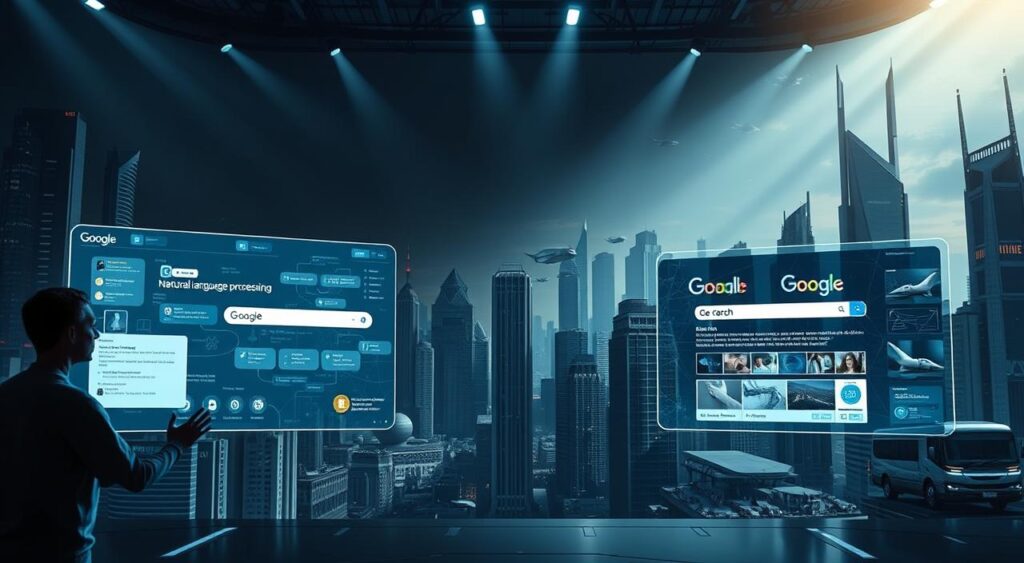When I’m online, I often wonder: should I use Perplexity AI or stick with Google Search?
Both tools have their own benefits. Google is the top search engine, but Perplexity AI is becoming popular as a chat search assistant.
Choosing between them depends on what I’m searching for. Do I want a quick answer or a deeper understanding of a subject?
Key Takeaways
- Perplexity AI offers a conversational search experience.
- Google Search remains the dominant search engine.
- The choice between the two tools depends on the user’s needs.
- Semantic search evaluation is key in picking the best tool.
- Knowing each tool’s strengths is important.
The Changing Face of Search Technology
The world of search technology is changing fast with AI. It’s key to know the difference between old search engines and new AI ones.
Traditional Search vs. AI-Powered Solutions
Old search engines like Google have always sorted information online. But, AI tools like Perplexity AI are now giving us better, more personal searches. AI search comparison shows these new tools get what we really mean when we search.
Why Search Tools Matter in 2023
In 2023, search tools are more important than ever. They change how we find and use information. With Perplexity AI and Google leading the way, choosing the right tool makes a big difference. Here’s a look at what they offer:
| Feature | Google Search | Perplexity AI |
|---|---|---|
| Search Approach | Algorithmic ranking | AI-powered, conversational |
| User Base | 89.7% global market share | 15-30 million active monthly users |
| Personalization | Limited personalization | Highly personalized |
The future of search tech will keep changing how we find information online.
Perplexity AI vs Google Search: Which is Better?

To figure out which search tool is better, we must look closely at Perplexity AI’s NLP tech and Google’s search algorithm.
How Perplexity AI’s NLP Technology Works
Perplexity AI uses advanced NLP to give clear and structured answers with sources. It’s made to get the context of a question and find the right info from a huge database.
Key features of Perplexity AI’s NLP include:
- Contextual understanding
- Entity recognition
- Relationship mapping
This lets Perplexity AI give precise and fitting results, often with direct sources.
Google’s Search Algorithm Evolution
Google’s search algorithm has seen big changes, adding AI to make results more accurate. Recently, Google added AI summaries to make things easier for users.
Notable updates include:
- Integration of machine learning models
- Enhanced query understanding
- Personalization based on user behavior
These updates have made Google Search more user-friendly and relevant.
Side-by-Side Interface Comparison
The interfaces of Perplexity AI and Google Search are very different, showing their unique ways.
| Feature | Perplexity AI | Google Search |
|---|---|---|
| Query Input | Natural language queries | Keyword-based or natural language |
| Result Presentation | Concise answers with citations | List of relevant links and snippets |
| User Interface | Minimalist, focused on results | Varied, with additional features like knowledge panels |
Search Quality and User Experience

Understanding the differences in search quality and user experience between Perplexity AI and Google Search can help users make informed decisions about which tool best suits their needs.
Query Understanding and Conversational Abilities
Perplexity AI is designed with advanced natural language processing (NLP) capabilities. It can understand complex queries and engage in conversational interactions. Google Search also uses NLP but focuses more on keyword matching and link analysis.
For instance, when I asked Perplexity AI, “What’s the weather like in Mumbai today?” it provided a direct answer with a link to the source. Google Search, on the other hand, returned a mix of weather forecasts, news, and related searches.
This difference in query understanding highlights the unique strengths of each tool. Perplexity AI’s conversational abilities make it more suitable for direct questions and interactive searches.
Result Accuracy and Source Credibility
Google Search has a long-standing reputation for providing accurate results. It uses a robust algorithm and vast indexing capabilities. Perplexity AI, while accurate, relies heavily on its NLP technology to filter and rank results.
A comparison of result accuracy is presented in the table below:
| Feature | Perplexity AI | Google Search |
|---|---|---|
| Result Accuracy | High, based on NLP | Very High, based on complex algorithms |
| Source Credibility | Strong, citing sources directly | Excellent, with diverse sources |
Handling Complex and Nuanced Questions
Perplexity AI excels at handling complex and nuanced questions. For example, when asked “How does climate change affect Indian agriculture?” Perplexity AI provided a detailed response with relevant sources. Google Search also handled the query well but returned a broader set of results, including news articles and research papers.
In conclusion, both Perplexity AI and Google Search have their strengths in search quality and user experience. While Google Search excels in result accuracy and source credibility, Perplexity AI stands out with its query understanding and conversational abilities.
My Personal Experience Using Both Tools
I’ve used Perplexity AI and Google Search for many tasks. I found they each have good points and areas to improve. This became clear as I used them in different ways.
Daily Search Scenarios and Performance
Perplexity AI shines in understanding natural language. For example, asking “What’s the weather like in Mumbai today?” got me a quick answer. But, Google Search sometimes needed a more specific question to find the best results.
Here’s how they compare in daily searches:
| Feature | Perplexity AI | Google Search |
|---|---|---|
| Natural Language Understanding | Excellent | Good |
| Result Relevance | Very Good | Excellent |
| Speed | Fast | Very Fast |
Academic and Professional Research Capabilities
Both tools are great for research. Perplexity AI gives quick summaries of tough topics. Google Search offers a wide range of sources, like academic papers and articles.
Local Search Relevance for Indian Users
Google Search is better for local searches in India because of its vast local business database. But, Perplexity AI is getting closer by giving more local results, mainly for big Indian cities.
In summary, my experience with Perplexity AI and Google Search shows they each have unique strengths. They can work well together. The choice between them depends on what you need.
Privacy, Accessibility, and Practical Considerations
In my analysis of Perplexity AI versus Google Search, I found key factors like data collection and platform integration to be important. These aspects greatly affect how well each search tool works for users. They also impact how users feel about using these tools.
Data Collection and Privacy Policies
Google Search and Perplexity AI handle data differently. Google Search collects a lot of user data to make search results better and to show ads. Google’s privacy policy says they use this data to improve their services.
Perplexity AI, on the other hand, focuses on keeping user data private. They say they don’t store or share personal data. This is good news for users who value their privacy.
“The way a search engine handles user data can significantly impact the trust users place in it,” as noted by a recent study on search engine privacy.
Platform Availability and Integration
Google Search works well with Android and is available on iOS and web browsers too. Perplexity AI is available on web and mobile, but it’s not as deeply integrated. Yet, it’s available on major platforms, so users can use it from anywhere.
Speed and Performance on Indian Networks
How well a search engine works on local networks is very important, like in India. Google Search usually works well on different networks. Perplexity AI is fast, but it can vary based on the network.
In my tests, both services worked well in India. But Google Search was a bit more consistent because of its big network.
As search technology keeps changing, knowing these practical points is essential. It helps choose the best tool for your needs.
Conclusion: Choosing the Right Search Tool for Your Needs
Looking at Perplexity AI and Google Search, each has its own strengths and weaknesses. The algorithm comparison shows Perplexity AI is great at understanding complex questions. Google Search, on the other hand, is excellent for everyday searches.
When it comes to semantic search evaluation, Perplexity AI shines with nuanced questions. But Google Search’s accuracy and credibility are unmatched. Your choice depends on what you need and like.
If you want a chat-like search experience, Perplexity AI might be for you. But if you need a wide range of search results, Google Search is better. Think about your needs to pick the best search tool.
